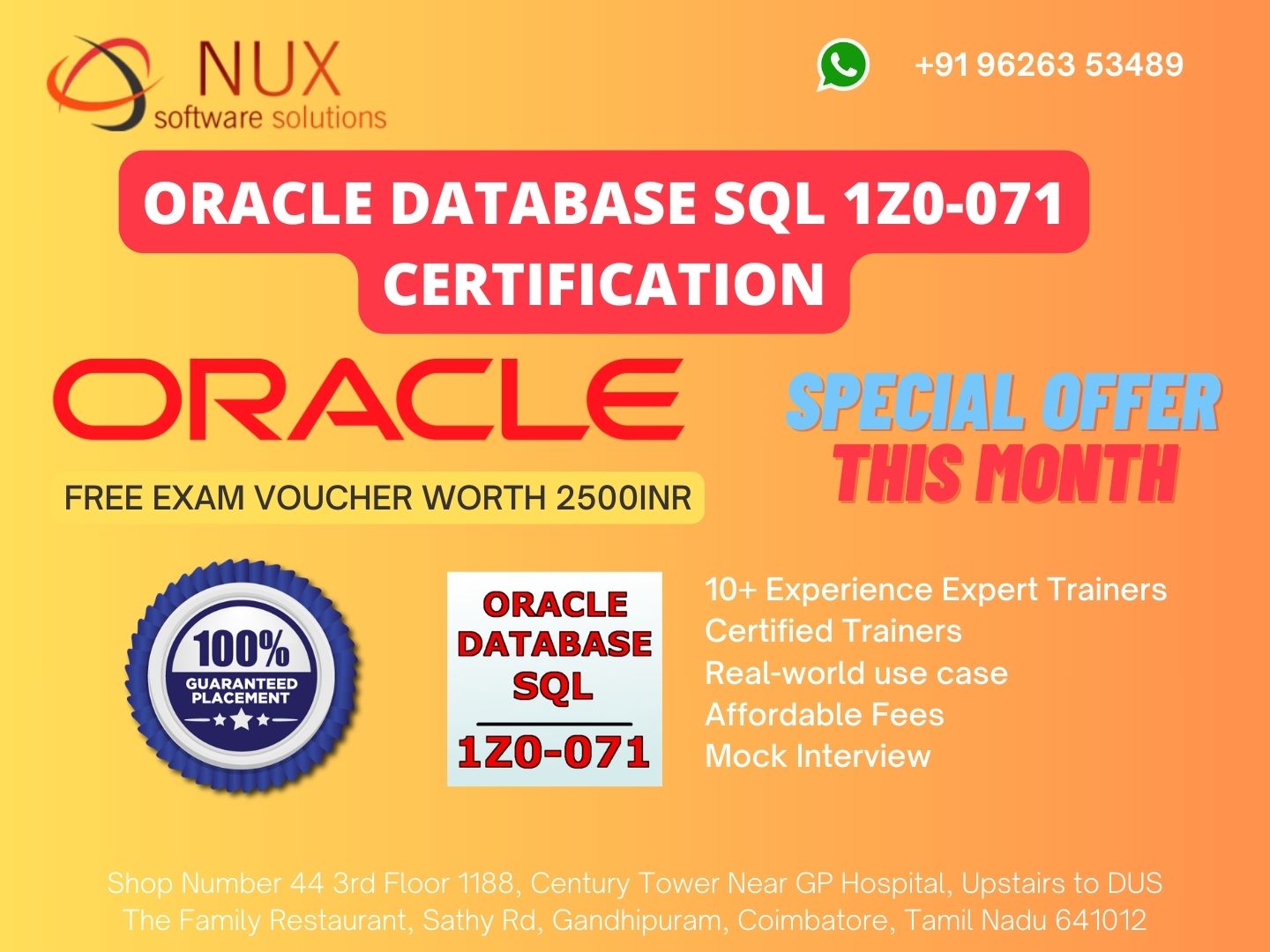Oracle Database SQL – 1Z0-071

Course Summary
This course is designed to help students and professionals develop strong SQL skills to interact with and manipulate data stored in Oracle databases. It aligns with the Oracle 1Z0-071 certification exam, which is a foundational requirement for many Oracle certifications and career paths in database development and administration.
Through structured training and hands-on labs, learners will gain a deep understanding of how to write SQL queries, retrieve and filter data, perform joins, manage tables, and work with views and indexes—all within an Oracle RDBMS context.
Why Choose This Course
SQL is the core language for managing data across all relational databases—and Oracle Database is one of the most widely used platforms in the enterprise. This course enables you to:
Build a solid foundation in SQL for Oracle Database
Prepare confidently for the Oracle 1Z0-071 certification exam
Gain industry-relevant SQL skills for data analysis, reporting, and backend development
Learn from instructors with real-world Oracle project experience
Position yourself for advanced certifications in Oracle PL/SQL, DBA, or Developer tracks
Who Should Enroll
This course is ideal for:
Students and recent graduates looking to enter the IT or database field
Developers and analysts who need a working knowledge of SQL for Oracle
Database administrators preparing for higher Oracle certifications
Candidates planning to take the Oracle Database SQL (1Z0-071) exam
Professionals in data-driven roles including finance, operations, BI, and software development
Skills You Will Gain
Proficiency in writing SQL queries to extract and manipulate Oracle data
Understanding of data types, constraints, joins, subqueries, and set operators
Ability to manage tables, views, indexes, synonyms, and user access
Familiarity with aggregate functions, grouping, and data transformation
Insight into Oracle’s implementation of relational database concepts and best practices
Career Benefits
After completing this course, you will:
Be prepared to pass the Oracle 1Z0-071 SQL certification exam
Qualify for roles like SQL Developer, Oracle Analyst, or Junior DBA
Build a foundation for advanced Oracle certifications (e.g., OCA, OCP, PL/SQL)
Enhance your résumé with a globally recognized credential
Improve your ability to work on database-backed applications, reports, or data analytics projects
Start Your Oracle Journey with SQL Mastery
SQL is the first step toward a successful career in data, development, and Oracle technologies. This course helps you build confidence, certification, and capability—all in one program.
Take control of your data career. Enroll with Linux Training Center today.
Course Syllabus
Modules
- Explaining the theoretical and physical aspects of a relational database
- Relating clauses in SQL Select Statement to Components of an ERD
- Explaining the relationship between a database and SQL
- Using Column aliases
- Using The SQL SELECT statement
- Using concatenation operator, literal character strings, alternative quote operator, and the DISTINCT keyword
- Using Arithmetic expressions and NULL values in the SELECT statement
- Applying Rules of precedence for operators in an expression
- Limiting Rows Returned in a SQL Statement
- Using Substitution Variables
- Using the DEFINE and VERIFY commands
- Sorting Data
- Manipulating strings with character functions in SQL SELECT and WHERE clauses
- Performing arithmetic with date data
- Manipulating numbers with the ROUND, TRUNC and MOD functions
- Manipulating dates with the date function
- Applying the NVL, NULLIF, and COALESCE functions to data
- Understanding implicit and explicit data type conversion
- Using the TO_CHAR, TO_NUMBER, and TO_DATE conversion functions
- Nesting multiple functions
- Restricting Group Results
- Creating Groups of Data
- Using Group Functions
- Using Self-joins
- Using Various Types of Joins
- Using Non equijoins
- Using OUTER joins
- Understanding and Using Cartesian Products
- Using Single Row Subqueries
- Using Multiple Row Subqueries
- Update and delete rows using correlated subqueries
- Matching the SELECT statements
- Using the ORDER BY clause in set operations
- Using The INTERSECT operator
- Using The MINUS operator
- Using The UNION and UNION ALL operators
- Managing Database Transactions
- Controlling transactions
- Perform Insert, Update and Delete operations
- Performing multi table Inserts
- Performing Merge statements
- Managing Indexes
- Managing Synonyms
- Managing Sequences
- Describing and Working with Tables
- Describing and Working with Columns and Data Types
- Creating tables
- Dropping columns and setting column UNUSED
- Truncating tables
- Creating and using Temporary Tables
- Creating and using external tables
- Managing Constraints
- Managing Views
- Differentiating system privileges from object privileges
- Granting privileges on tables
- Distinguishing between granting privileges and roles
- Using data dictionary views
- Working with CURRENT_DATE, CURRENT_TIMESTAMP,and LOCALTIMESTAMP
- Working with INTERVAL data types



